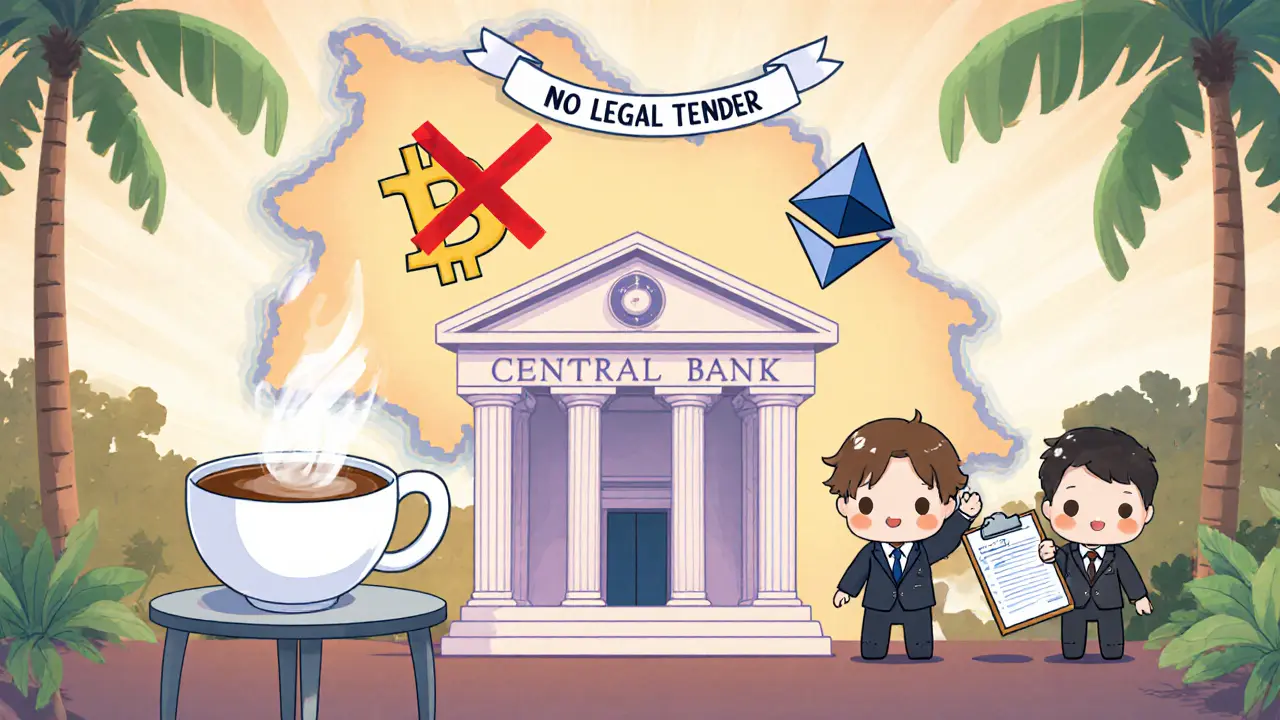Costa Rica VASP Setup Cost Calculator
Calculate Your VASP Setup Costs
When you hear about countries that have embraced crypto, names like ElSalvador or Panama often pop up. CostaRica, however, has taken a different route: it still doesn’t recognize any digital token as legal tender, but it is busy building a compliance‑first framework that could make the nation a haven for responsible crypto firms.
What "no official recognition" really means
CostaRica is a Central American republic that, as of July2025, has explicitly stated through the Central Bank of Costa Rica (CBCR) that cryptocurrencies are not legal tender, monetary currency, or foreign currency. In plain English, you can’t pay your coffee with Bitcoin, and banks won’t treat crypto like pesos. The government’s stance is not a ban - you can still buy, sell, and hold digital assets - but there’s no sovereign endorsement or official currency status.
The evolving legal landscape
Two bills are currently shaping the future:
- Bill 22.837 (Proyecto de Ley Expediente22.837) - the first formal attempt to amend LawNo.7786, which deals with narcotics, money laundering and terrorist financing. Its first legislative debate happened on July22025, and the final vote is slated for October2025.
- Bill 23.415, often called the “Cryptoassets Market Law”, is moving through committee review and focuses on licensing Virtual Asset Service Providers (VASPs) and setting AML/CFT standards.
Both proposals avoid granting legal‑tender status. Instead, they define “virtual assets” and lay out registration, reporting, and risk‑assessment rules.
Defining virtual assets and VASPs
Virtual Asset Service Provider (VASP) is defined by CostaRica’s draft legislation as any entity that exchanges virtual assets for legal tender, facilitates transfers, provides custody, or issues/markets virtual assets. The Superintendencia General de Entidades Financieras (SUGEF) will act as the overseer, requiring VASPs to register but explicitly stating that registration does not equal a government‑issued operating licence.
Key compliance obligations
Any VASP wishing to operate must meet a suite of AML/CFT requirements:
- Implement robust Know‑Your‑Customer (KYC) procedures for both individuals and entities.
- Maintain transaction logs for at least five years, with the ability to retrieve data on demand.
- Conduct enhanced due diligence on politically exposed persons (PEPs) and high‑risk jurisdictions.
- Perform regular risk assessments and internal audits, usually on a quarterly basis.
- Appoint a full‑time compliance officer - a role that 65% of surveyed crypto firms in CostaRica already fill, earning salaries between ₡4.5million and ₡7.2million per month.
Technical guidelines suggest a monitoring system capable of handling at least 1,000 transactions per hour, costing roughly $25,000‑$75,000 to set up depending on the firm’s size.

How to register a VASP in CostaRica
Here’s a practical step‑by‑step checklist for crypto entrepreneurs:
- Form a legal entity - most startups choose a "Sociedad Anónima" (SA) with minimum capital of $10,000‑$50,000. Registration typically wraps up in 15‑20 business days.
- Draft AML/CFT policies that align with FATF and the upcoming OECD Crypto‑Asset Reporting Framework (CARF). Include client onboarding forms, transaction‑suspicion reporting procedures, and employee training modules.
- Submit a registration request to SUGEF, attaching corporate documents, policy manuals, and a risk‑assessment report.
- Await SUGEF’s review - the agency usually replies within 30‑45 days. No approval means you can still operate, but you’ll be subject to heightened scrutiny.
- Set up a banking relationship. Expect initial resistance; many traditional banks reject crypto clients. Smaller institutions with a fintech focus are more willing, often after an on‑site audit.
- Implement a transaction‑monitoring platform. Vendors like Chainalysis or Elliptic can provide SaaS solutions that meet the 1,000‑TPS benchmark.
Following this path can shave weeks off the onboarding timeline, but be ready for a three‑month compliance‑setup phase and a $30,000‑$70,000 budget.
Banking challenges - the biggest friction point
Even after you tick all the regulatory boxes, opening a corporate bank account remains the toughest hurdle. Reddit threads from June2025 reveal entrepreneurs facing six to eight months of negotiations, with three major banks turning them down before a niche credit union finally accepted the account under strict monitoring.
The Central Bank’s Financial Inclusion Report (July2025) notes that 43% of CostaRican banks lack the technical infrastructure to service crypto firms. SUGEF plans a $2.3million upgrade to its KYC platform by Q42025, which may ease the bottleneck, but the gap will likely persist for at least another year.
Why the cautious approach could be an advantage
Compared with ElSalvador’s aggressive Bitcoin‑as‑legal‑tender policy or China’s outright ban, CostaRica’s middle‑ground offers a stable environment for long‑term projects. The European Business Review (2025) points out that the country has no heavy tax on crypto profits and enjoys political stability, low corporate tax rates, and a well‑developed telecom infrastructure.
Market data from PwC’s Knowledge Navigator (July2025) estimates the CostaRican crypto market at $1.2billion, representing 1.8% of Central America’s total. With a projected compound annual growth rate of 23.5% through 2028, the sector could reach $3billion if the regulatory framework finalises on schedule.

Comparison of crypto regulatory stances in the region
| Country | Legal Tender Status | Regulatory Body | Key Legislation (2023‑2025) | Banking Climate |
|---|---|---|---|---|
| CostaRica | No | SUGEF | Bill22.837, Bill23.415 (AML‑focused) | Mixed - major banks hesitant, fintech‑friendly niche banks emerging |
| ElSalvador | Yes (Bitcoin) | Central Reserve Bank | Bitcoin Law (2021) | Improving, but still limited international correspondent banking |
| Panama | No | Superintendencia del Mercado de Valores | Law89 (Regulatory Sandbox, 2023) | Generally supportive, active crypto‑friendly banking sector |
What this table shows is that CostaRica sits squarely in the “cautious but open” column - no official currency status, but a clear roadmap toward AML‑compliant operations.
Practical tips for crypto entrepreneurs considering CostaRica
- Plan for compliance early. Build your AML policies before you submit the VASP registration; SUGEF reviewers will flag gaps quickly.
- Partner with a local legal firm that understands both corporate law and the emerging crypto statutes.
- Leverage a cloud‑based monitoring solution to avoid costly on‑premise hardware.
- Start banking conversations with fintech‑focused credit unions; bring your compliance documentation to the first meeting.
- Keep an eye on the October2025 legislative calendar - the final vote on Bill22.837 could lock in the regulatory baseline you need.
Following these steps can shave months off the setup timeline and protect you from costly compliance missteps.
Future outlook - what’s next after the bills pass?
Assuming both bills clear the Assembly, CostaRica will likely achieve full alignment with FATF standards by mid‑2026. This alignment could attract multinational crypto exchanges looking for a jurisdiction with solid AML frameworks but without the heavy tax burdens seen in India or the regulatory uncertainty of the United States.
However, the “no legal tender” stance will remain, meaning that mainstream consumer adoption may lag behind ElSalvador. Expect growth to be driven by B2B services - custody providers, cross‑border payment gateways, and blockchain consulting firms - rather than retail wallet usage.
Frequently Asked Questions
Is cryptocurrency illegal in CostaRica?
No. Crypto is not illegal, but it is not recognized as legal tender. You can own and trade digital assets, provided you follow AML/CFT rules.
Do I need a licence to start a crypto business?
You must register as a VASP with SUGEF. Registration is mandatory but does not grant a special licence; it simply puts you on the regulator’s watch list.
How hard is it to open a bank account?
It can be challenging. Major banks often decline crypto‑related accounts. Smaller fintech‑focused banks are more receptive, especially if you present a solid compliance program.
When will the crypto bills be finalized?
Bill22.837 is expected to be voted on by October2025. Bill23.415 should follow shortly thereafter, with full implementation targeted for 2026.
What taxes apply to crypto profits?
CostaRica currently imposes no specific crypto tax. Profits are taxed like any other capital gain under the standard corporate income tax rates.







Kim Evans
October 16, 2025 AT 08:26When you look at Costa Rica's approach you can see a clear emphasis on compliance over hype, and that is refreshing :) The Central Bank has explicitly said crypto is not legal tender, which eliminates the risk of sudden policy flips that we saw elsewhere. By defining virtual assets and VASPs early, the regulator gives firms a predictable framework to work within. The draft Bill 23.415 requires robust KYC, AML, and transaction monitoring, which aligns with FATF standards. For a startup, the first step is to incorporate a legal entity, preferably a Sociedad Anónima, with a capital base that satisfies the $10,000‑$50,000 threshold. Next, you need to draft AML policies that cover client onboarding, transaction thresholds, and suspicious activity reporting; this documentation will be scrutinized by SUGEF. Once the policies are ready, submit the registration package including corporate bylaws, risk‑assessment reports, and the compliance manual. Expect a review period of 30‑45 days, after which you will either receive a registration acknowledgment or a request for additional information. Even with registration, you can operate, but you will be under heightened supervision, so keeping meticulous records for five years is essential. Setting up a transaction‑monitoring platform that can handle at least 1,000 TPS will likely cost between $25,000 and $75,000, and vendors like Chainalysis or Elliptic offer SaaS solutions that meet this benchmark. Banking remains the toughest hurdle; many traditional banks still shy away, so targeting fintech‑friendly credit unions with a solid compliance dossier can reduce onboarding time from eight months to three. Remember that the Central Bank plans a $2.3 million upgrade to its KYC infrastructure by Q4 2025, which should gradually ease the banking bottleneck. The overall tax environment is favorable, with crypto profits taxed like regular capital gains under the standard corporate tax rate, and there is no specific crypto levy. By planning compliance early, you can shave weeks off the registration timeline and avoid costly re‑works later. The projected market growth of 23.5 % CAGR through 2028 suggests that early movers will capture significant market share. In summary, treat compliance as a competitive advantage rather than a bureaucratic obstacle, and you’ll find Costa Rica a welcoming jurisdiction for responsible crypto ventures.
Steve Cabe
October 24, 2025 AT 11:06Strong national oversight ensures that crypto activities serve the country’s economic interests without compromising security.
shirley morales
November 1, 2025 AT 12:46The discourse surrounding Costa Rica's regulatory posture is riddled with superficial enthusiasm; one must instead appreciate the nuanced equilibrium it strives to maintain between innovation and prudence.
Bruce Safford
November 9, 2025 AT 15:26Look ho there, the real reason they push this compliance drabble is to control the flow of capital for the shadow elite, dont you think the whole thing is a smokescreen? The bills look legit but theres a hidden agenda to funnel crypto gains into off‑shore accounts tied to political cabals, thats why they keep hammering on KYC while ignoring the real money laundering channels. Trust no one, the system is rigged from the start.
Blue Delight Consultant
November 17, 2025 AT 18:06From a philosophical standpoint, the Costa Rican model epitomizes a balanced dialectic between libertarian aspiration and state custodianship. By eschewing legal‑tender status, the nation avoids the ontological pitfalls of monetary sovereignty, yet by instituting a rigorous compliance schema it safeguards the collective good. Practically, this means that entrepreneurs must internalize ethical considerations as part of their operational ethos, thereby fostering a culture of responsibility that transcends mere regulatory checkbox compliance. In essence, the regulatory architecture functions as a moral compass, guiding market participants toward sustainable, socially beneficial outcomes.
Wayne Sternberger
November 25, 2025 AT 20:46Indeed, the moral compass you mention is essential, but remember to double check the paperwork for minor misspellings, they can cause unforeseen delays in the registration process.
Gautam Negi
December 3, 2025 AT 23:26While many hail Costa Rica's middle‑ground as pragmatic, I contend that the nation risks becoming a mere sandbox for external actors. The legislative hesitation may be driven more by a desire to attract foreign capital than by any genuine commitment to domestic financial sovereignty. If the bills pass without substantive amendments, the regulatory veneer may crumble under the weight of international scrutiny, leaving local enterprises exposed.
Shauna Maher
December 12, 2025 AT 02:06Exactly! The whole thing reeks of a covert operation to siphon wealth while pretending to be transparent. Their "compliance‑first" mantra is just a distraction from the real power plays happening behind the scenes. Anyone with an eye can see the manipulation, yet the masses stay blind.
Kyla MacLaren
December 20, 2025 AT 04:46I think the guide is super helpful, but maybe we could add a note about local legal counsel? It would make the whole process smoother for newbies.
Jim Greene
December 28, 2025 AT 07:26Great point! 😊 Having a local lawyer can definitely speed things up and keep you out of trouble later.
Jennifer Bursey
January 5, 2026 AT 10:06From a cultural integration perspective, the Costa Rican framework serves as a bridge between fintech innovation and legacy banking infrastructure, facilitating a symbiotic ecosystem that leverages both agility and stability.
Kevin Duffy
January 13, 2026 AT 12:46Exactly, it’s a win‑win scenario! 🚀
Cynthia Chiang
January 21, 2026 AT 15:26I appreciate the thoroughness of the previous comments. It’s crucial for newcomers to understand that while the regulatory environment may appear daunting, the availability of community resources and mentorship programs can greatly alleviate the learning curve. Engaging with local crypto meetups and online forums provides practical insights that supplement official guidelines. Moreover, establishing a solid compliance foundation early on not only satisfies SUGEF requirements but also builds trust with prospective banking partners.
Hari Chamlagai
January 29, 2026 AT 18:06The emphasis on community support is valid, yet one must acknowledge that regulatory compliance is non‑negotiable; without it, any operational ambition is futile.
Ben Johnson
February 6, 2026 AT 20:46So, basically, if you’re not ready to play by Costa Rica’s rulebook, you might as well pack up and move elsewhere.
Jason Clark
February 14, 2026 AT 23:26Sure thing, the rulebook is just a suggestion, right? (Just kidding – it’s actually pretty strict.)
Della Amalya
February 23, 2026 AT 02:06The dramatic narrative of Costa Rica’s crypto journey is compelling, yet the real story lies in the diligent effort of compliance officers who navigate the intricate tapestry of regulations, ensuring that every transaction is recorded, audited, and reported with precision.